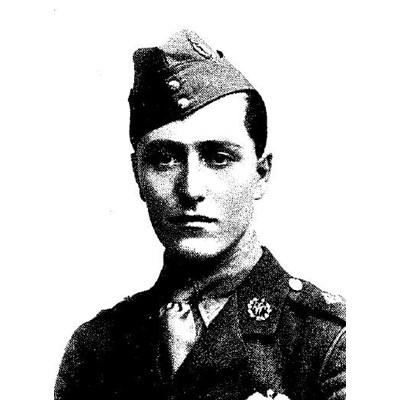Mollison, John Jack (1898 - 1918)

Lieutenant, 208th Sqdn. Royal Air Force
Buried at Sun Quarry Cemetery, Cherisy
Commemorated at Hillhead High School
Lieutenant Jack Mollison was the younger son of Mr. and Mrs. John Mollison, 6 Kelvin Drive, Kelvinside. The report that he was posted "missing," that word of ill omen in this war, caused profound sorrow in the School, for Jack was known and beloved by everyone. He was of a most attractive and lovable nature, good humour and good feeling radiating from him. Straightforward, honourable, high minded, he possessed the entire confidence of comrades and benchers.
The O.T.C. had in him one of its most enthusiastic and efficient members. During his last year at School he was a sergeant and chief kettle-drummer in the band. In 1913 he gained the efficiency cup and two medals, one being for the best shot in the corps. Rugby and swimming also claimed his interest, and in both he was a notable performer, gaining many prizes for the latter at the Western swimming galas.
On leaving School he entered Skerry's College, intending to sit the examination for Sandhurst, but his eager, loyal spirit chafed at the inactivity of the student, and he enlisted in the 6th H.L.I. before he was seventeen years of age.
After eighteen months in the ranks he was sent as a Cadet to Pirbright, Surrey. At the close of his period of training he asked to be transferred to the Royal Air Force, and in March, 1918, he gained his pilot's certificate.
After a short leave at home he left for France in April. There he was just in time to take part in the most strenuous work the Royal Air Force ever had. The task of staying the advancing Germans and gaining time to fill up the ranks of the infantry, thinned and in some case shattered by incessant fighting against heavy odds, fell largely on the cavalry of the air. Night and day they bombed the serried ranks of the Germans, inflicting frightful casualties, and finally holding up their advance.
Jack, writing home, tells how he was often up and over the enemy lines three times in one day. A quiet period followed, and then, with the beginning of the final British advance, the Air Force were again called upon for the most strenuous service. In this Lieutenant Mollison played a gallant part, but on the 27th August he failed to return from a bombing expedition, and was posted missing.
A long period of suspense followed, but finally a grave was found in Cherisy cemetery, near Arras, with his name and number upon it. One of the pathetic features in his case is that at the time he went missing his leave was overdue, and the very telegram that announced his fate was opened joyfully in the belief that it contained intimation of his early arrival.
Sunt lachrymæ rerum et mentem mortalia tangunt.
The whole-hearted sympathy of the School goes out to his parents and sister, who are thus for the second time bereaved.




